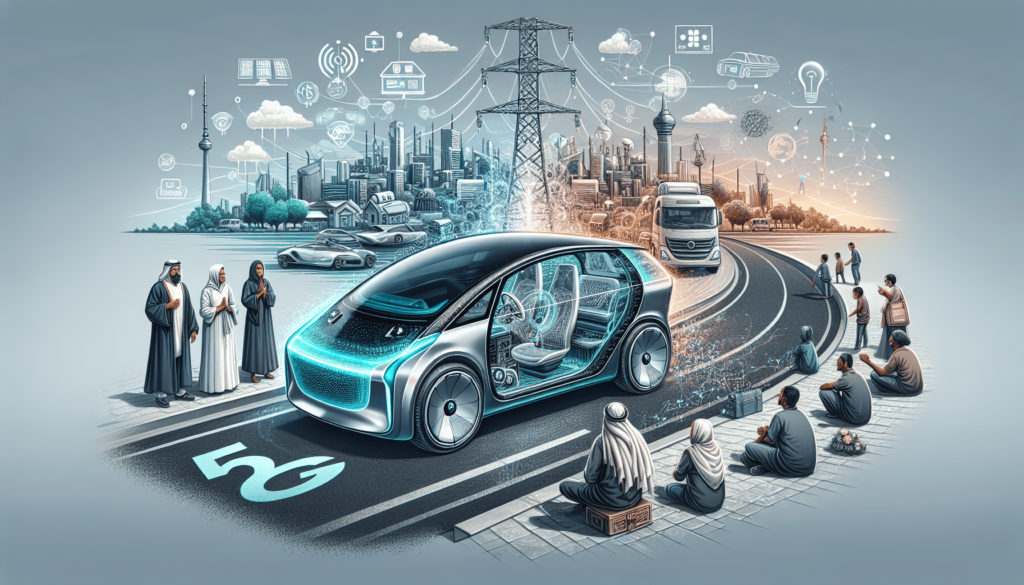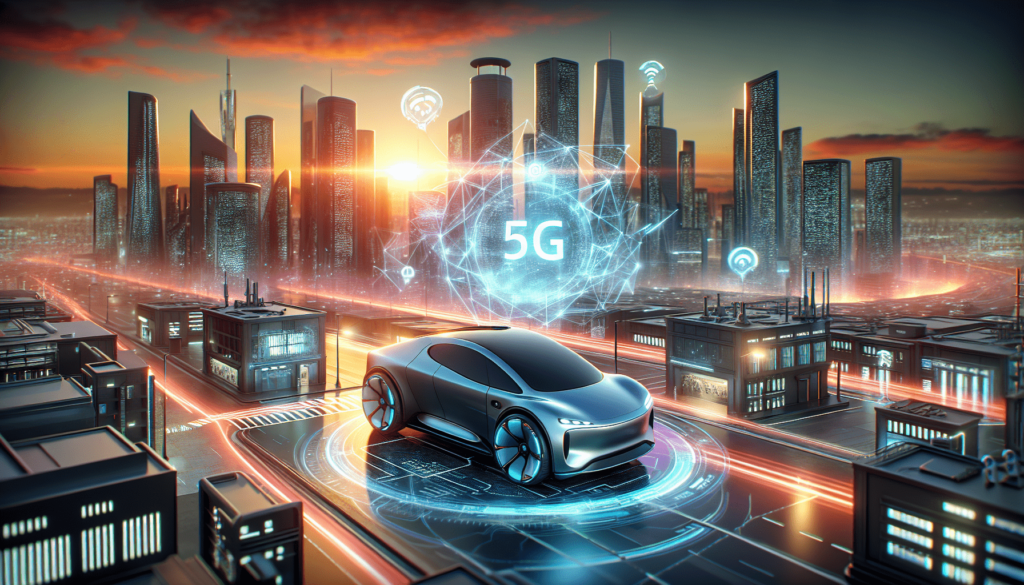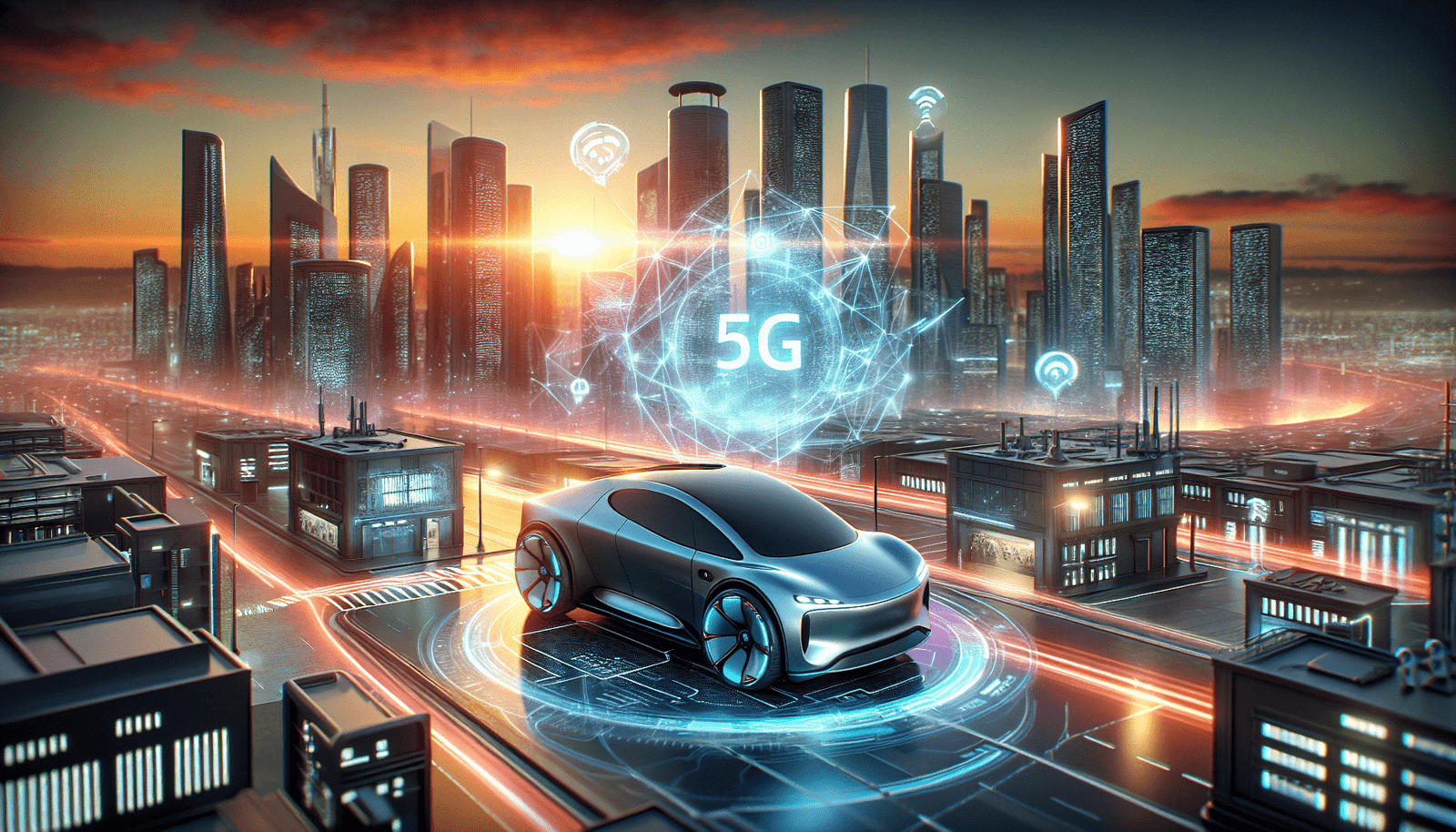Imagine a world where your electric vehicle seamlessly connects to the internet, allowing you to monitor its performance, charge your vehicle remotely, and even receive real-time traffic updates tailored to your specific route. With the advent of 5G technology, this dream is becoming a reality. The impact of 5G on electric vehicle connectivity is set to revolutionize the way we interact with our vehicles, enhancing their capabilities and making our driving experience more efficient and convenient than ever before. In this article, we will explore the transformative potential of 5G technology and how it will shape the future of electric vehicle connectivity.

Improved Communication
Faster and more reliable communication
With the advent of 5G technology, electric vehicle (EV) connectivity is set to experience a significant boost. 5G allows for faster and more reliable communication between vehicles and infrastructure, enabling seamless data transfer and information exchange. This means that EVs can communicate with charging stations, traffic management systems, and other vehicles in real-time, enhancing overall efficiency and safety.
Real-time data sharing between vehicles and infrastructure
One of the major benefits of 5G technology is its ability to facilitate real-time data sharing between vehicles and infrastructure. This means that EVs can receive up-to-date information about road conditions, traffic congestion, availability of charging stations, and more. This real-time data sharing enables EVs to make informed decisions and take optimal routes, leading to reduced travel time and improved overall efficiency.
Enhanced vehicle-to-vehicle communication
5G not only enables communication between vehicles and infrastructure but also enhances vehicle-to-vehicle (V2V) communication. This means that EVs can communicate with other vehicles on the road, exchanging information about their location, speed, and direction. This enhanced V2V communication allows for better coordination between vehicles, reducing the risk of accidents and improving overall traffic flow.
Efficient Vehicle Charging
Optimized charging infrastructure
5G technology plays a crucial role in optimizing the charging infrastructure for electric vehicles. With its fast and reliable communication capabilities, 5G enables seamless communication between EVs and charging stations. This means that EVs can locate available charging stations, reserve a charging slot, and make payments in real-time. Additionally, 5G technology allows for dynamic charging, where charging stations can adjust the charging rate based on the EV’s battery status and demand, ensuring efficient energy usage.
Smart grid integration
The integration of 5G technology with the smart grid is another significant development in the field of electric vehicle connectivity. Smart grid integration enables EVs to not only charge efficiently but also supply energy back to the grid when required. This two-way communication between EVs and the grid allows for peak-load management, balancing energy demand and supply, and optimizing overall grid performance.
Real-time monitoring of charging stations
5G technology enables real-time monitoring of charging stations, providing valuable insights into their status and performance. Charging stations equipped with 5G connectivity can transmit data about their availability, maintenance needs, and energy consumption. This real-time monitoring allows for better management of charging infrastructure, ensuring that EV owners have access to reliable and operational charging stations when needed.
Enhanced Autonomous Driving
Improved safety and navigation systems
The integration of 5G technology with electric vehicles paves the way for improved safety and navigation systems. With real-time data sharing and communication capabilities, EVs can access accurate and up-to-date information about road conditions, hazards, and traffic patterns. This enables autonomous driving systems to make informed decisions, enhancing the safety and efficiency of EVs on the road.
Real-time traffic information
5G technology enables the seamless transmission of real-time traffic information to electric vehicles. EVs can receive live updates about traffic congestion, accidents, and diversions, allowing them to adjust their routes accordingly. This not only helps EVs avoid unnecessary delays but also contributes to overall traffic management and reduces congestion on busy routes.
Seamless integration with smart city infrastructure
The integration of 5G technology with smart city infrastructure is a game-changer for electric vehicle connectivity. EVs can seamlessly communicate with smart traffic signals, parking facilities, and other city infrastructure, improving their overall efficiency and convenience. For example, EVs can receive information about available parking spaces in real-time, enabling them to locate and access charging stations conveniently.
Intelligent Traffic Management
Reduced traffic congestion
5G technology plays a vital role in reducing traffic congestion on the roads. By providing real-time data about traffic flow, EVs can navigate through congested areas more efficiently, reducing travel time and minimizing delays. Additionally, 5G-enabled smart traffic signal control systems can adjust signal timings based on real-time traffic conditions, optimizing traffic flow and reducing bottlenecks.
Precise mapping and route planning
With the help of 5G technology, electric vehicles can access precise mapping and route planning services. EVs can receive accurate and updated maps that take into account traffic conditions, road closures, and real-time data. This enables EVs to plan their routes efficiently, avoiding congested areas and maximizing time and energy efficiency.
Smart traffic signal control
The integration of 5G technology with smart traffic signal control systems allows for more efficient traffic flow management. Traffic signals equipped with 5G connectivity can communicate with EVs, prioritizing their movement to reduce congestion and improve overall traffic efficiency. This intelligent traffic management system ensures that EVs have a smoother and more streamlined experience on the roads.

Increased Energy Efficiency
Optimized battery management
5G technology enables optimized battery management for electric vehicles. With its fast and reliable communication capabilities, EVs can communicate with charging stations and the grid, ensuring that the battery is charged efficiently. EVs can receive real-time updates about the battery’s charging status, allowing owners to optimize their charging patterns and prolong the battery life.
Energy-saving features
The integration of 5G technology with electric vehicles brings with it energy-saving features. EVs can receive information about low-energy routes, optimal driving techniques, and energy-saving tips in real-time. This encourages EV owners to adopt energy-efficient driving practices, reducing energy consumption and contributing to a greener and more sustainable environment.
Smart energy consumption monitoring
With 5G technology, EVs can monitor their energy consumption in real-time. EV owners can access information about their energy usage, charging patterns, and energy-saving techniques through their vehicle’s infotainment system or smartphone applications. This real-time monitoring empowers EV owners to make informed decisions about their energy usage and encourages responsible energy consumption.
Enhanced User Experience
In-vehicle connectivity and entertainment
The integration of 5G technology with electric vehicles greatly enhances the in-vehicle connectivity and entertainment options. With high-speed internet connectivity, EVs can offer seamless access to online services, music streaming platforms, and video content. Passengers can stay connected, entertained, and productive during their journeys, enhancing the overall user experience.
Seamless integration with smart devices
5G technology enables seamless integration between electric vehicles and smart devices. EV owners can control various aspects of their vehicle, such as climate control, battery status, and charging preferences, through their smartphones or other smart devices. This integration enhances convenience and allows for remote monitoring and control of EV functionality.
Personalized driver assistance systems
With the integration of 5G technology, electric vehicles can offer personalized driver assistance systems. EVs can collect data about driving patterns, preferences, and road conditions, tailoring their assistance and recommendations accordingly. This enhances the overall driving experience and promotes safer and more efficient driving practices.
New Business Opportunities
Emergence of new service providers
The widespread adoption of 5G technology in the electric vehicle industry is expected to create new business opportunities. Service providers can develop innovative solutions and platforms to leverage the benefits of 5G connectivity, such as charging station management systems, real-time data analytics, and mobility services. This opens up avenues for entrepreneurship and promotes economic growth in the electric vehicle sector.
Development of innovative applications
5G technology provides a platform for the development of innovative applications in the electric vehicle space. Developers can create applications that optimize EV charging, provide personalized recommendations for energy-efficient driving, or enable peer-to-peer sharing of charging stations. These applications enhance the overall EV experience and contribute to the growth and evolution of electric vehicle connectivity.
Integration with other industries
The integration of 5G technology with electric vehicle connectivity extends beyond the automotive industry. 5G connectivity can be leveraged for smart city initiatives, intelligent transportation systems, and energy management solutions. This integration creates synergies between various industries, fostering collaboration and innovation to create a more sustainable and connected future.
Challenges and Limitations
Need for significant investment and infrastructure development
The widespread adoption of 5G technology in the electric vehicle industry requires significant investment in the development of infrastructure. The establishment of 5G networks, installation of charging stations equipped with 5G connectivity, and the upgrade of existing systems all entail substantial financial commitments. However, the long-term benefits provided by 5G technology justify these investments and pave the way for a more efficient and sustainable transportation system.
Ensuring data privacy and security
As with any technological advancement, ensuring data privacy and security is crucial in the context of 5G-enabled electric vehicle connectivity. With the extensive data exchange and communication between vehicles and infrastructure, it is essential to have robust security measures in place to protect sensitive information. Industry stakeholders and regulatory bodies must work together to establish cybersecurity frameworks and regulations to safeguard the privacy and security of EV owners and users.
Compatibility issues with legacy vehicle systems
The integration of 5G technology with electric vehicle connectivity may pose compatibility challenges with legacy vehicle systems. Older vehicle models may lack the necessary hardware or software capabilities to fully leverage the benefits of 5G connectivity. This calls for effective transition strategies and standardized protocols to ensure that all electric vehicles can benefit from the advancements enabled by 5G technology.
Sustainability and Environmental Impact
Reduced carbon emissions
The integration of 5G technology with electric vehicle connectivity has the potential to significantly reduce carbon emissions. By optimizing energy usage, providing real-time traffic information, and facilitating efficient charging, 5G enables greener transportation practices. The increased adoption of electric vehicles coupled with the benefits of 5G connectivity can contribute to a substantial reduction in greenhouse gas emissions, promoting a more sustainable future.
Promotion of renewable energy sources
With 5G technology and electric vehicle connectivity, there is an increased focus on promoting and integrating renewable energy sources. EVs can act as mobile energy storage devices, allowing excess energy generated from renewable sources to be stored and consumed when needed. This integration of electric vehicles with renewable energy sources helps accelerate the transition to a cleaner and more sustainable energy ecosystem.
Integration with smart city initiatives
The integration of 5G technology with electric vehicle connectivity aligns with smart city initiatives that aim to create more sustainable and connected urban environments. Electric vehicles, with the support of 5G connectivity, can seamlessly integrate with smart traffic management systems, parking facilities, and energy grids. This integration enables efficient resource utilization, optimized transportation systems, and reduced environmental impact.
Future Outlook
Widespread adoption of 5G technology
The future of electric vehicle connectivity lies in the widespread adoption of 5G technology. As the infrastructure for 5G networks continues to expand worldwide, electric vehicles will increasingly benefit from faster and more reliable communication capabilities. This will enhance overall efficiency, safety, and convenience, contributing to the growth and evolution of electric vehicle technology.
Integration with emerging technologies like AI and IoT
The integration of 5G technology with electric vehicle connectivity opens up possibilities for further advancements through emerging technologies like artificial intelligence (AI) and the Internet of Things (IoT). AI-powered algorithms can analyze vast amounts of data collected from EVs and infrastructure to optimize charging, traffic management, and navigation systems. Additionally, the IoT can enable seamless communication and coordination between EVs, charging stations, and traffic management systems, creating a more connected and intelligent transportation ecosystem.
Transformation of transportation and urban mobility
The impact of 5G technology on electric vehicle connectivity extends beyond individual vehicles. The widespread adoption of 5G and the integration of electric vehicles with smart city infrastructure are set to transform transportation and urban mobility. With more efficient and connected transportation systems, cities can tackle issues like traffic congestion, air pollution, and resource depletion, creating more livable and sustainable environments for their residents.
In conclusion, the impact of 5G technology on electric vehicle connectivity is immense. From improved communication and efficient vehicle charging to enhanced autonomous driving and intelligent traffic management, 5G plays a crucial role in revolutionizing the electric vehicle industry. With increased energy efficiency, enhanced user experience, and new business opportunities, 5G technology paves the way for a greener, smarter, and more connected future of transportation.

